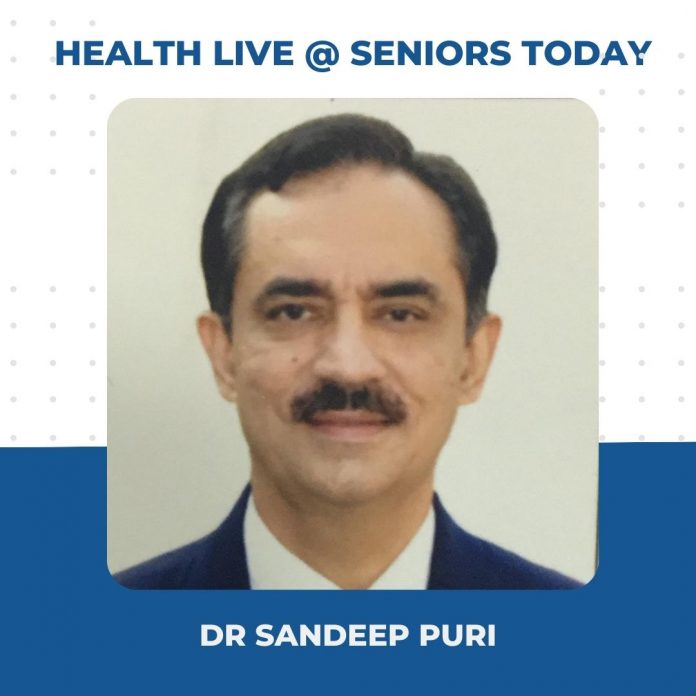In a Q&A session on hypertension and senior health care, Dr Puri addressed several concerns and gave an insight on importance of maintaining blood pressure and basic senior health
On Saturday, August 22, Health Live @ Seniors Today hosted senior doctor and dean of the Dayanand Medical College & Hospital to address questions on hypertension and general health care for senior citizens.
Dr Puri is also Chairman Board of Studies in Medical Sciences (Postgraduate), Baba Farid University of Health Sciences, Faridkot. He was awarded the Fellowship by the Indian College of Physicians, Indian Academy of Clinical Medicine, International Medical Science Academy and Membership of National Academy of Medical Sciences. He has also trained in Rheumatology at the AIIMS, New Delhi in 2002. He has supervised 35 thesis, participated in 7 multinational clinical trials and published 51 articles in various journals and chapter in books. His service to the community by donating blood 93 times is also to encourage the movement of blood donation.
Here are the takeaways from Health Live @ Seniors Today with Dr Sandeep Puri
1. Hypertension – Hypertension is high blood pressure. There are two types – primary and secondary. Primary hypertension or essential hypertension is high blood pressure that is common among people with no known cause. Secondary hypertension is high blood pressure caused by an underlying disease.
2. Know the cause of the symptom – It is important to know what is causing you certain symptoms such as heart beating fast while climbing the stairs or sudden rise in your blood pressure or feeling tired.
3. Factors to rule out –Factors such as regular exercising of any form, sedentary lifestyle, bp levels, haemoglobin levels should be ruled out. If these factors are in place and yet you experience any symptoms you need to get yourself checked.
4. Ambulatory BP monitoring – It is a device that you wear for 24 hours and it will continuously monitor your blood pressure at frequent intervals of 15 mins. When a patient has a wide bp fluctuation – sudden drops or rise in the bp, or if the bp does not normalise with medication, that is when an ambulatory bp monitoring is performed.
5. Whitecoat hypertension – This is a kind of hypertension that is caused when you walk into the doctor’s clinic. People suffering from whitecoat hypertension will have a sudden rise in their blood pressure when they are around doctors. However, for such people an ambulatory monitoring is recommended to check their baseline bp.
6. Salt restrictions–The climate of the place, what you eat, how much you eat matters. You need to be careful when it comes to salt restrictions – you should not have zero salt in your food. Sometimes salt restriction leads to low sodium levels in body which should be prevented.
7. Four grams of salt – On average a person should consume five grams of salt per day but it will be a good idea to drop that one gram. This way you will be able to balance your sodium levels in your body.
8. Avoid salted munchies – Refrain munching on namkeens, they are packed with salts and this will only contribute to an increased salt intake. So, if you are hypertensive you need to cut down on your salt intake.
9. Anxiety caused by Covid-19 –The pandemic scare has contributed to rise in hypertension. So, if you experience sudden increase in your heart rate and your bp is not normalising get yourself examined. Meanwhile you can monitor your bp at home, do your routine exercisewalking/yoga and have a well-balanced meal.
10. Common Salt v/s Rock Salt – There are no study yet that suggests rock salt is better than common salt. However, which ever salt you opt for keep in mind that the less salt your intake the better it is for your health.
11. Clinical trial of a drug – Every drug before reaching the mass undergoes a clinical trial. There are three phases of this trial
- Phase I – This is the initial stage where the drug is tested on animals to check whether it can be used on humans.
- Phase II – After testing on animals the trail is performed robustly on a group of humans to check its safety.
- Phase III – When the drug reaches phase III it is considered safe for a large group of human trials to check its efficiency.
If there are two drugs being tested and if one shows more efficiency then the other one is discontinued/terminated.
12. Healthy lifestyle – It is possible to stop BP medicines if you have adopted a healthy lifestyle compared to your earlier one with a stable bp that does not cross 130/85. Then you are safe and can stop your bp medication. Your lifestyle matters a lot if you want to stop medication.








